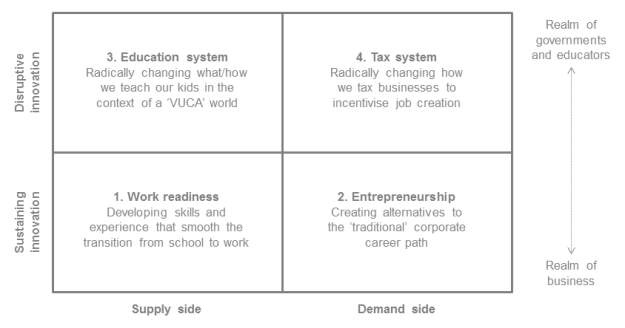The interconnected challenges of the climate emergency and deepening social inequality are the symptoms of a system that doesn’t fully account for impacts on people and planet. Historically, the fundamental purpose of creating a product or service has been to create profit — not only that, but to pursue maximum profit for a small group of people, which necessarily depends on externalizing social and environmental costs.
As pressure mounts on all sides, there can be no long-term future for any business that’s seen to undermine the health of the very social and environmental systems on which we all depend. The tables must turn if business is to live up to its claim to be part of the solution. It must reimagine what it’s for, reframing the fundamental purpose of business as profitably solving the problems of people and planet, and not profiting from causing them.
As Paul Hawken writes in Regeneration, if we’re to succeed in engaging the bulk of humanity in ending the climate crisis, we need to create a world worth saving — one that addresses current human needs and injustices, not an imagined dystopian future. This means enshrining social justice, economic inclusion and environmental regeneration as intertwined design values and operating principles for everything business does. It means innovating new products, services and business models as the vehicles for advancing these principles, and solving the defining problems of our time. And it means redefining success, with profit not an end in itself, but the means to scale (and what flows from scaling) equitable access to those solutions.
This is where impact enterprises already live. Impact entrepreneurs make it their business to identify the causes of exclusion and marginalization; to develop, test and scale new value propositions with the potential to disrupt that status quo; and to forge a new state that creates long-term value for society and builds the ecosystem to sustain it. If impact enterprises signal the future of business — and I believe that they do — then we should be doing everything in our power to see that they achieve scale and prominence as quickly as possible.
Helping impact enterprises to reach true scale and prominence isn’t just an end in itself, though. Nor should it be seen or understood as a one-way act of benevolence. That’s because providing undeniable examples that there’s a different way to run successful businesses that solve society’s toughest challenges is also the means to achieve something bigger — to encourage businesses of all sizes to think and act more like impact enterprises.
When the ingenuity of social innovators meets the scale of large corporations, that’s when we shall finally reach a tipping point. So, to paraphrase JFK, let’s not only ask what large corporations can do for impact enterprises. Let’s also ask what impact enterprises can do for large corporations.
There’s a reason we find many of the best ideas and boldest actions for tackling inequality among impact enterprises operating in low-income and marginalized communities. It’s because necessity is the mother of invention. This is where people are at the sharp end, not only of inequality, but also the impacts of climate change that threaten to deepen it still further.
Likewise, there is a reason the Sustainable Development Goals (SDGs) also go by the shortened moniker of the Global Goals. While challenges are certainly more acute in low-income countries — where billions of our fellow human beings are still denied equitable access to life’s essentials, such as clean water, reliable energy and dignified sanitation — inequality is not unique to those contexts.
Feelings of being left behind by the forces of globalization, and frustration at the lack of meaningful action to avert runaway climate change, are rife throughout societies all around the world. If business truly wants to be seen as part of the solution, and not the cause, then it must recognize the interdependence of economic, social and ecological systems. It must understand that all three can only thrive when social justice and environment regeneration are embraced as essential to long-term economic prosperity and business success.
For corporations wishing to better understand how to weave those concerns into every aspect of their decision-making, who better to work with and learn from than impact enterprises?
